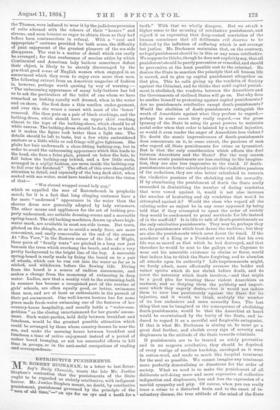RETRIBUTIVE PUNISHMENTS. M R. ROBERT BI/OHANIN, in a letter to last
Satur- day's Daily Chronicle, treats the late Mr. Justice 'Stephen's contention that the punishments of the State ought to be regarded as strictly retributive, with indignant horror. Mr. Justice Stephen meant, no doubt, by retributive punishment, punishment governed by the principle of the :nen of old time,"—." an eye for an eye and a tooth for a. tooth." With that we wholly disagree. Bob we attach a higher sense to the meaning of retributive punishment, and regard it as expressing that deep-rooted conviction of the human conscience that all deliberate evil deserves to be followed by the infliction of suffering which is not revenge but justice. Mr. Buchanan maintains that, on the contrary, no legal punishment should be in this or any sense retributive. We suppose be thinks, though he does not explicitly say, that all punishment should be purelypreventive or remedial, and should be preventive at the least possible cost to the criminal. He _desires the State to sanction the principle that all human life is sacred, and to give up capital punishment altogether on that plea. This he calls giving up the vendetta of Society against the Criminal, and he thinks that until capital punish- ment is abolished, the vendetta between the Anarchists and the Governments of civilised States will go on. But why does he confine himself to protesting against capital punishments P Are no punishments retributive except death-punishments P Would the abolition of death-punishments extinguish the wrath of Anarchists against what they profess to regard,— perhaps in some cases they really regard,—as the gross tyranny of the State in using its great powers to maintain social order when that order is tainted by a radical injustice, or would it even render the anger of Anarchists less violent P No doubt the scenic impressiveness of death-punishments does concentrate on it, to some extent, the passions of men who regard all State punishments for crime as tyrannical. But is that the only consideration which affects the duel between Anarchists and the State P For the very reason that leas scenic punishments are less exciting to the imagina- tion, they are also less impressive to the timid. If death. punishments are better calculated to stir the vindictive passions of the audacious, they are also better calculated to restrain the vindictive passions of the shrinking and the cowardly. If by abandoning the punishment of death the State really succeeded in diminishing the number of daring vendettas , that were vowed against it, would it not also increase the number of hesitating and sly vendettas that wou'd be attempted against it? Would the class who regard all the existing order as unjust be in any sense appeased by being told that if they attempted to upset the order of society they would be condemned to penal servitude for life instead of to the scaffold ? It is idle to talk of death-punishments as the only retributive punishments. They may be, perhaps they are, the punishments which least daunt the reckless ; but they are also the punishments which most daunt the timid. If the murderer of a King or a President were told that his own life was as sacred as that which he had destroyed, and that therefore he would be sent to the galleys or to Cayenne to wear out his miserable existence in chains or fever, would that induce him to think the State forgiving, and to abandon all attacks upon its authority? Life-imprisonments might, we freely admit, more effectually overawe the bolder and vainer spirits which do not shrink before death, and do covet the notoriety which death involves,—and that might be a good plea for treating these violent Anarchists as madmen, and so denying them the publicity and import- ance which they eagerly desire,—but it would not induce them to rave less passionately against the State for its injustice, and it would, we think, multiply the number of its less audacious and more cowardly foes. The last thing that can be imagined as the consequence of abolishing death-punishments, would be that the Anarchist at heart would be overwhelmed by the lenity of the State, and in- duced to regard it as a merciful and forgivable antagonist. If that is what Mr. Buchanan is aiming at, he must go a great deal further, and abolish every sign of severity and displeasure in the attitude of the State towards criminals.
If punishments are to be treated as solely preventive and in no respects retributive, they should be deprived of every vestige of needless hardship, enveloped as it were in cotton-wool, and made as much like hospital treatment for the soul as possible. We cannot imagine any treatment more perfectly demoralising or disastrous for the order of society. What we need is to make the punishment of all deliberate evil-doing more and more expressive of collective indignation and displeasure, less and less the expression of a morbid sympathy and pity. Of course, when you can really trace a crime to a disturbed brain and to the onset of in- voluntary disease, the true attitude of the mind, of the State is compassion and not retribution. But wherever there are the clear evidences of deliberate and reasoned evil-doing, there there ought to be as open and vivid an expression of disgust and disinterested resentment as it is possible for a great tribunal of justice to embody in its judgments. To our minds, the value of the punishment of death for the greatest crimes, perhaps its chief value, is that it enables the State to graduate the expression of its disgust and impersonal resentments so much more effectively, by providing it with an intense and most expressive embodiment of supreme indignation and horror for the worst crimes. If Mr. Buchanan knows anything about education, he must know that the punishments which are most effective with children are those which are most carefully and subtly graduated to the just displeasure of the parent, those which are most truly not vindictive but yet retributive, that is, significant of dis- interested resentment and displeasure where such resentment and displeasure are really deserved, and which are, on the other hand, mere fines or tasks where they are the consequences, not of evil design and of deliberate but of incon- siderate heedlessness. And so it will be with the State. If once the expression of collective disapprobation and resent- ment,—if once the truly retributive element, in the ethical sense,—vanishes from our criminal code, and we begin to treat deliberate moral evil as if it were all involuntary disease, our criminal code will lose all its terror and become more and more ineffectual and imbecile. If pity is to replace justice, and all wrong-doers are to be regarded as patients of the State, who have been sent to hospital for treatment, we shall lose the greatest instrument we ever pos- sessed for the repression of selfishness and crime. It is only as a free being who has wilfully transgressed a just law, that man really trembles at the penal code. It may be that some of these Anarchists are really irresponsible, are really lunatics, though their purposes are coherent. Where there is any in- dependent evidence of that condition of mind, let them have the benefit of it by all means. It would be most unjust t3 deny them what we willingly accord to other lunatics who have taken life without any evil intention. But where there is no evidence of anything but their indifference to the moral law, and the passion of rebels against all social authority, let the displeasure and horror of society against that state of mini be expressed with all the energy of an out- raged conscience and of that disinterested love of righteous- ness on which every healthy human society rests,



































 Previous page
Previous page